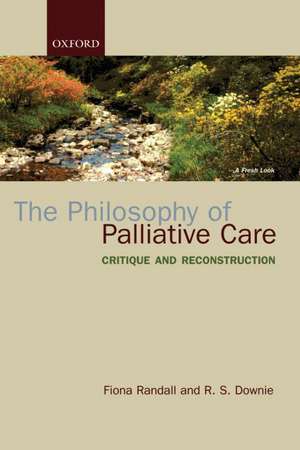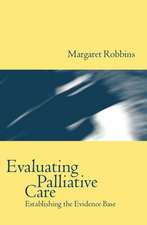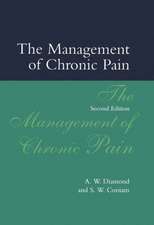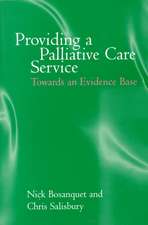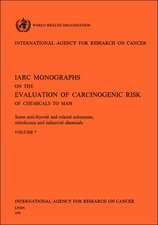The Philosophy of Palliative Care: Critique and reconstruction
Autor Fiona Randall, R. S. Downieen Limba Engleză Paperback – 23 feb 2006
Preț: 520.99 lei
Preț vechi: 636.48 lei
-18% Nou
Puncte Express: 781
Preț estimativ în valută:
99.70€ • 103.96$ • 82.86£
99.70€ • 103.96$ • 82.86£
Carte tipărită la comandă
Livrare economică 10-17 martie
Preluare comenzi: 021 569.72.76
Specificații
ISBN-13: 9780198567363
ISBN-10: 0198567367
Pagini: 256
Dimensiuni: 157 x 233 x 16 mm
Greutate: 0.39 kg
Editura: OUP OXFORD
Colecția OUP Oxford
Locul publicării:Oxford, United Kingdom
ISBN-10: 0198567367
Pagini: 256
Dimensiuni: 157 x 233 x 16 mm
Greutate: 0.39 kg
Editura: OUP OXFORD
Colecția OUP Oxford
Locul publicării:Oxford, United Kingdom
Recenzii
I think it is timely that we re-examine what it is that we do, which is what this interesting and thought-provoking book does.
...the work is honest and realistic. The authors define, acknowledge and justify the limits of what is possible and desirable in the relationship between doctors, other care workers, patients and families in palliative care. I believe it is a product of their intellectual rigour combined with deep and long immersion in the practical realities of the field...[and is] the most important achievement of their work; it is enlightening, shows proper humility and lays waste to the lofty arrogance of the various definitions,'philosophies' and 'position statements' that are generated by some large and powerful institutions. This book has my wholehearted recommendation.
Within a slim and readable 226 pages, they expose a significant number of basic inconsistencies and contradictions that they find in the currently accepted 'norms' or the speciality. But rather than leave it at that somewhat negative position, they also defend the achievements of the speciality and proceed to record the positive parts of the current situation. Finally, they present their case for a new philosophical statement to underpin the speciality as it adapts to work in the medical system of the 21st century...an excellent and easily accessible text which I suspect will be referred to a great deal in debates and discussions about the future of Palliative Care.
It was/is often stated in book reviews that "this book should on every 's bookshelf". Well, I believe that this book should be in every hospice library bookshelf. It is asking important questions to every palliative care physician and clinician of whatever profession. As a result of reading this book they will be better informed and regard palliative care in a better way. Although the book is a critique it does highlight (at least to me) why palliative care is an essential component of any healthcare set up.
...the work is honest and realistic. The authors define, acknowledge and justify the limits of what is possible and desirable in the relationship between doctors, other care workers, patients and families in palliative care. I believe it is a product of their intellectual rigour combined with deep and long immersion in the practical realities of the field...[and is] the most important achievement of their work; it is enlightening, shows proper humility and lays waste to the lofty arrogance of the various definitions,'philosophies' and 'position statements' that are generated by some large and powerful institutions. This book has my wholehearted recommendation.
Within a slim and readable 226 pages, they expose a significant number of basic inconsistencies and contradictions that they find in the currently accepted 'norms' or the speciality. But rather than leave it at that somewhat negative position, they also defend the achievements of the speciality and proceed to record the positive parts of the current situation. Finally, they present their case for a new philosophical statement to underpin the speciality as it adapts to work in the medical system of the 21st century...an excellent and easily accessible text which I suspect will be referred to a great deal in debates and discussions about the future of Palliative Care.
It was/is often stated in book reviews that "this book should on every 's bookshelf". Well, I believe that this book should be in every hospice library bookshelf. It is asking important questions to every palliative care physician and clinician of whatever profession. As a result of reading this book they will be better informed and regard palliative care in a better way. Although the book is a critique it does highlight (at least to me) why palliative care is an essential component of any healthcare set up.
Notă biografică
Fiona Randall is a consultant in palliative medicine, with a background in health care ethics and philosophy. She has served on BMA ethics committees, the Association of Palliative Medicine ethics working party, and has been recently involved in drafting the UK law on decision making for patients lacking capacity. She is also on the editorial board of the Journal of Palliative CareRobin Downie has been a member of various government and professional committees and working parties dealing with issues of medical ethics. He is now an Honorary Professorial Research Fellow and Emeritus Professor of Moral Philosophy at the University of Glasgow.
